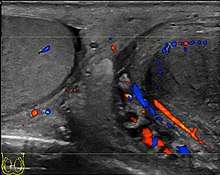Orchitis
Orchitis is inflammation of the testes.[1] It can also involve swelling, pains and frequent infection, particularly of the epididymis, as in epididymitis. The term is from the Ancient Greek ὄρχις meaning "testicle"; same root as orchid.
| Orchitis | |
|---|---|
| Other names | Orchiditis |
| Pronunciation |
|
| Specialty | Urology |
Signs and symptoms
Symptoms of orchitis are similar to those of testicular torsion. These can include:
Causes
Orchitis can be related to epididymitis infection that has spread to the testicles (then called "epididymo-orchitis"), sometimes caused by the sexually transmitted diseases chlamydia and gonorrhea. It has also been reported in cases of males infected with brucellosis.[2] Orchitis can also be seen during active mumps, particularly in adolescent boys.
Ischemic orchitis may result from damage to the blood vessels of the spermatic cord during inguinal herniorrhaphy, and may in the worst event lead to testicular atrophy.[3]
Diagnosis

- Blood – ESR high
- Urine – Cultural & Sensitivity test
- Ultrasound scanning
Treatment
In most cases where orchitis is caused by epididymitis, treatment is an oral antibiotic such as cefalexin or ciprofloxacin until infection clears up. In both causes non-steroidal anti-inflammatory drugs such as naproxen or ibuprofen are recommended to relieve pain. Sometimes stronger pain medications in the opiate category are called for and are frequently prescribed by experienced emergency department physicians.
Other animals
Orchitis is not rare in bulls and rams. It has also been described in roosters.[4]
References
- "orchitis" at Dorland's Medical Dictionary
- Brucellosis in Humans and Animals World Health Organization Publication number WHO/CDS/EPR/2006.7
- Simons MP, Aufenacker T, Bay-Nielsen M, et al. (August 2009). "European Hernia Society guidelines on the treatment of inguinal hernia in adult patients". Hernia. 13 (4): 343–403. doi:10.1007/s10029-009-0529-7. PMC 2719730. PMID 19636493.
- Monleon R, Martin MP, John Barnes H (December 2008). "Bacterial orchitis and epididymo-orchitis in broiler breeders". Avian Pathology. 37 (6): 613–7. doi:10.1080/03079450802499134. PMID 19023758.
Further reading
- Lefort C, Thoumas D, Badachi Y, et al. (July 2001). "Orchites ischémiques: À propos de 5 cas diagnostiqués en écho-Doppler couleur" [Ischemic orchiditis: review of 5 cases diagnosed by color Doppler ultrasonography]. Journal de Radiologie (in French). 82 (7): 839–42. PMID 11507447. INIST:1080037.
- Chung JJ, Kim MJ, Lee T, Yoo HS, Lee JT (September 1997). "Sonographic findings in tuberculous epididymitis and epididymo-orchitis". Journal of Clinical Ultrasound. 25 (7): 390–4. doi:10.1002/(SICI)1097-0096(199709)25:7<390::AID-JCU7>3.0.CO;2-5. PMID 9282805.
- Fong Y, Wantz GE (May 1992). "Prevention of ischemic orchitis during inguinal hernioplasty". Surgery, Gynecology & Obstetrics. 174 (5): 399–402. PMID 1570618.
- Beard CM, Benson RC, Kelalis PP, Elveback LR, Kurland LT (January 1977). "The incidence and outcome of mumps orchitis in Rochester, Minnesota, 1935 to 1974". Mayo Clinic Proceedings. 52 (1): 3–7. PMID 609284.
- Bigazzi PE, Kosuda LL, Hsu KC, Andres GA (February 1976). "Immune complex orchitis in vasectomized rabbits". The Journal of Experimental Medicine. 143 (2): 382–404. doi:10.1084/jem.143.2.382. PMC 2190126. PMID 129498.
- Lynch VP, Eakins D, Morrison E (August 1968). "Granulomatous orchitis". British Journal of Urology. 40 (4): 451–8. doi:10.1111/j.1464-410X.1968.tb11832.x. PMID 5678169.
- Dreyfuss W (April 1954). "Acute granulomatous orchiditis". The Journal of Urology. 71 (4): 483–7. doi:10.1016/S0022-5347(17)67813-3. PMID 13152871.
- Lambert B (1951). "The frequency of mumps and of mumps orchitis and the consequences for sexuality and fertility". Acta Genetica et Statistica Medica. 2 (Suppl. 1): 1–166. PMID 15444009.
- Grünberg H (1926). "Three unusual cases of chronic orchitis clinically resembling tumors of the testis". Frankfurt Z Pathol. 33: 217–27.
External links
| Classification | |
|---|---|
| External resources |